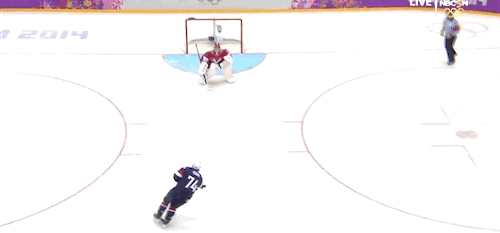In many sports, a world championship is often overshadowed by arguably the most revered stage in sports: the Olympics.
The United States has a history of dominating the Summer Olympics. That success does not carry over to the cold, as they tend to have less luck in the Winter Olympics. That is not necessarily an issue seeing that many European countries only have any noticeable success in Winter Olympics due to the geography and the cultures of those respective countries (Switzerland, Norway, Austria, etc.). But in the Olympic sports that the United States gives a lot of publicity to outside the Winter Olympics, such as snowboarding and skiing from the Winter X Games, America usually fares well.
So why can't the United States front a team that consistently sits on the hockey podium even though the NHL produces high-quality players? Why does the increase in American athletes in the NHL by 23.8% in the last 27 years not show more winning results on the world's biggest stage? Why are the Europeans still dominant even though a larger number of Americans are strapping on skates? And how can America both get on and stay on the podium?
It all starts and ends with the National Hockey League. The NHL must not keep players from participating in the Olympics if the United States and Canada want to see the best results on the international stage.
Hockey is very similar to soccer in that there are several leagues around the world, but only a handful of quality leagues where the big names play. In that similarity, where the best leagues play is reversed. The MLS is most certainly not on the same level as Bundesliga or La Liga. That means that America's best players go to La Liga, the Premier League, and Bundesliga instead of playing at home. This allows them to play in the most competitive and followed leagues with the best players from around the world. American hockey players, on the other hand, have no reason to go to other leagues to play because the NHL is viewed by the majority of people as the top league.
Europeans come from overseas to play in the NHL for the same reason: to play against the best talent. But, as is with the soccer leagues, the NHL is only slightly better than the KHL (in Russia), which is only slightly better than the SHL (in Sweden), which is only slightly better than the Liiga (in Finland)? This is the dilemma that the United States faces because even though the NHL is better a Russian may not want to leave home for a marginal increase in opportunity.
The NHL has a monopoly on the best American players. So, if the NHL makes a decision that assists themselves instead of the U.S.A. by restricting the players from competing in the Olympics, it's clear that the United States will suffer in the action. European teams, on the other hand, do not suffer as much considering a bulk of their quality players are still competing in their domestic leagues.
But if their best players are still overseas, how do they still outplay the Americans? Well, it all boils down to development. America's best, better, good, and okay players are playing in the NHL. Other countries only have a portion of their talent participating in the NHL.
That means that while the NHL is not letting any of its players go to the Olympics, other countries still have a solid core to build on for their own Olympic squads. This causes a huge issue when you have over 300 million people wanting to see their country win gold in the Olympic games but their team is lacking veteran talent.
The NHL has an obligation to support its teams, and keeping the best players competing regularly in the league supposedly helps keep the TV ratings up and helps avoid scheduling issues. But in reality, it doesn't. The fact of the matter is both the Olympic ratings and the NHL ratings are hurt by the restrictions. Not all NHL viewers are consistent viewers. Some only watch if their hometown basketball team isn't playing that night (which used to happen often with the Dallas Stars). Odds are that if an event like the Olympics is on, a lot of those viewers could be gone anyways. But the NHL succeeds in keeping their "real" fans around.
On that note, the Olympics secures many "loose" viewers but doesn't succeed in reeling in die-hard fans. Economically both sides are keeping the most viewers possible when accounting for the decisions of the opposing party. That is only a short-term result, though.
In the grand scheme of things, the NHL loses. Since the Americans don't see their favorite players on the Olympic stage, they don't get attached nor do they have as intense of a desire to follow along. When I started following hockey, T.J. Oshie was one of the first players not on the Dallas Stars (I recognized Jamie Benn, Kari Lehtonen, and Valeri Nichushkin right away) that I knew because of the Olympics.
And that brings up another point: people remember names! Names have stories and stories create empathy for fans.
I became more likely to follow Oshie's career because I had a desire to see Team USA do well and he was a key catalyst for the country in their 2014 run. Now, he's a Stanley Cup champion, and he was one of the players that I was happiest for. But the NHL decided not to participate in the greatest public relations platform in the world this past season.
For multinational teams like the Dallas Stars, players like Jamie Benn, Tyler Seguin, Alexander Radulov, John Klingberg, and Radek Faksa all missed out on a chance to wear their country's colors with pride as they competed for Olympic gold. And it's all because the league held them back and prohibited them from leaving for the two-week break. The NHL hurt itself more for the next three seasons than it helped itself for the remainder of the 2017-18 season as a result.
The NHL is a business that is looking out for its own good, which is only logical. On top of that, the NHL is currently in a rough market. Not only do other sports get bigger followings, but certain teams (like the Stars) are in non-traditional markets that can be tough to crack.
The only other major sporting association that is currently doing worse in the U.S.A. is soccer. Hockey in America is worse off than a league like the NFL but is better than soccer as a whole. Publicity is always the best way to get ratings and interest up. But to not participate in what is the biggest stage in sports is foolish. Not to mention it ruins a player's chances of participating in what could be the most rewarding opportunity of their career.
In the same way that teams have rebuilding phases, the NHL is now in a rebuilding phase. It missed out on a great opportunity to build its audience yet again and will be set back by this decision, but it can redeem itself in 4 years if it prioritizes the future.
For the reputation of the league, the quality of the league, and for the impressionable youth watching that dream about a Stanley Cup and an Olympic gold, the NHL must see the error in keeping its players from competing for their home countries.
Patriotism is stronger than the loyalty fans have for their teams.
If the NHL realizes that, they will be much better off down the road.
- Alex Ovechkin sarcastically thanks Gary Bettman for NHL Olympics ... ›
- Winter Olympics: Why ice hockey is missing biggest NHL stars - BBC ... ›
- Without NHL, Olympic Athletes from Russia are podium favorites ›
- By abandoning the Olympics, the NHL has done Russia a favour ... ›
- 2018 Olympics: Here's why there aren't any NHL players at the ... ›
- NHL will not participate in 2018 Olympics ›





















